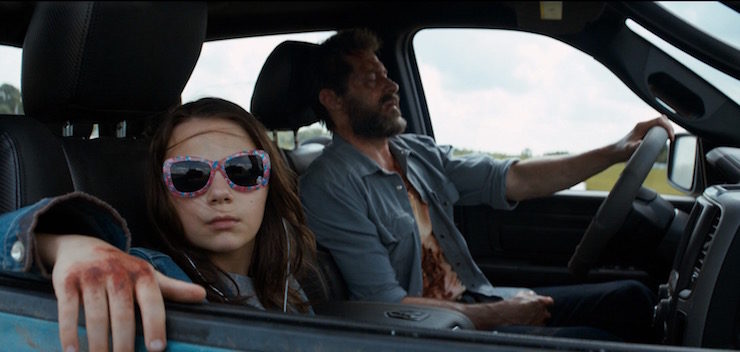Logan is a strange sort of superhero film. It made me laugh for all the wrong reasons, so determined as it was to embrace its postapocalyptic Western mood that it wandered into some fairly ridiculous territory—despite its at-times touching interest in, and commentary on, filial bonds and caregiving.
There are two things about Logan that I want to comment on. One is really interesting, and maybe unprecedented in superhero films; the other falls into an existing pattern that has a track record of annoying me. It’s fascinating to see them juxtaposed.
In Logan, Wolverine (Hugh Jackman) is cast in the role of caretaker to an elder father-figure, nonagenarian Charles Xavier (Patrick Stewart). Charles is suffering from some form of degenerative brain disorder. He alternates periods of lucidity between peevish confusion: a formerly very knowledgeable and extremely competent man rendered vulnerable and occasionally childish by age. Wolverine, meanwhile, is also suffering the effects of aging, and can no longer rely on his body and healing powers the way he used to.
Wolverine’s usually the symbolic epitome of one kind of masculinity: strong, violent, not very good at talking about his feelings. Where Wolverine’s emblematic of a violence-focused masculinity, Charles Xavier is emblematic of professorial, intellectual masculinity, a character whose physical disability is never seen as impinging upon his competence. But in Logan, Charles’ intellect is no longer reliable, much as Wolverine can no longer count on his strength as he used to. Wolverine has to take care of Charles, both physically and emotionally. (He’s not very good at being a reassuring caretaker.)
The role of caretaker for an elder is usually one that falls to women, both in fictional narratives and real life. But in Logan, the quintessentially masculine (though now somewhat decaying) Wolverine occupies this role. He does not necessarily perform its requirements well, but it’s really interesting that the narrative puts him in this role at all. It’s a break in the pattern of superhero films, which are usually not at all concerned with aging and the care of elders except, possibly, as obstacles to be overcome.
Wolverine’s care of and for Charles Xavier is paired with his reluctance to care for the child Laura (Dafne Keen), also known as X-23, the half-feral girl who shares Wolverine’s mutations: the claws and the healing powers. She doesn’t need anyone to save her, or to care for her in a physical sense, and Wolverine’s use to her is mostly in smoothing her interactions with other humans. (He does not do this very well.)
Laura’s superhuman powers and her facility with violence—and her seeming lack of regret for killing—make her an unusual figure. Women are not usually shown as super-soldiers in visual media, and on the rare occasions where they are, their facility with violence is almost always secondary to their sexual appeal. Prepubescent Laura is not, of course, shown in a sexual light, and the narrative embraces her destructive skills—juxtaposing them against Wolverine’s decaying competence and his role as a caretaker. (Would a Wolverine still at the height of his powers have been shown as a caregiver to this extent? It’s an interesting possibility to ponder.)
Both examples of the unsexualised female supersoldier that I can think of—Laura in Logan and Saoirse Ronan’s Hanna in the 2011 film of the same name—are prepubescent: children, endowed with a kind of moral innocence. This is the pattern that annoys me. The viewer may sympathise with a mature, self-destructive Wolverine, haunted by his many and various traumas, but we are never allowed to see a woman supersoldier in that same light.
It seems as though sexual maturity in women renders them automatically other: we are only allowed to see female supersoldiers when they, by virtue of their age and inexperience, are part of a class we-the-audience will always see as requiring protection. Despite Logan’s unusual willingness to play around with masculinity and caregiving, in this respect it’s conservative in its approach to traditional gender roles. An adult healthy competent Laura/X-23 cast opposite a decaying Wolverine, Charles Xavier’s caregiver, would have disrupted the paradigm entirely, and—however much I enjoyed Logan as a film—I’m left regretting that this isn’t something it was interested in giving us.
Liz Bourke is a cranky queer person who reads books. She holds a Ph.D in Classics from Trinity College, Dublin. Find her at her blog. Or her Twitter. She supports the work of the Irish Refugee Council and the Abortion Rights Campaign.










